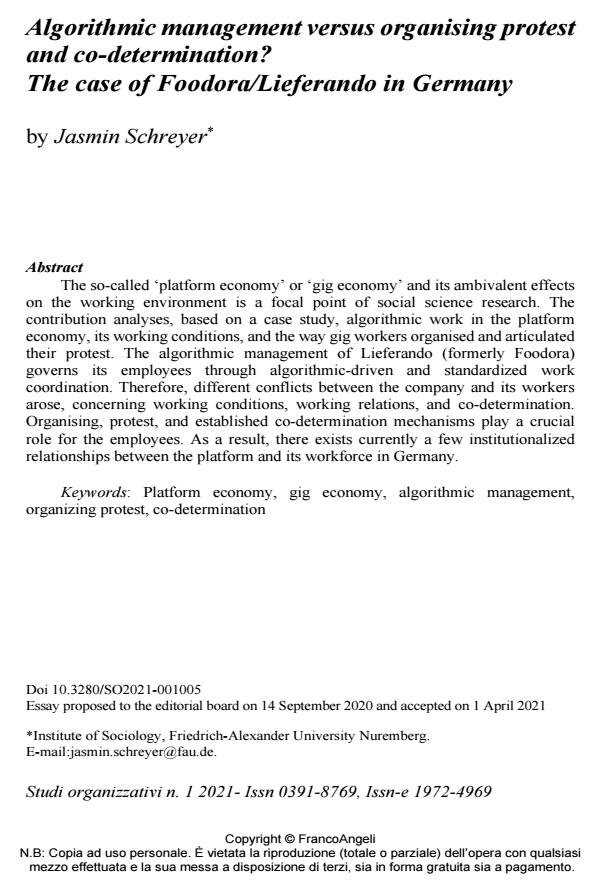Algorithmic management versus organising protest and co-determination? The case of Foodora/Lieferando in Germany
Journal title STUDI ORGANIZZATIVI
Author/s Jasmin Schreyer
Publishing Year 2021 Issue 2021/1
Language English Pages 24 P. 105-128 File size 289 KB
DOI 10.3280/SO2021-001005
DOI is like a bar code for intellectual property: to have more infomation
click here
Below, you can see the article first page
If you want to buy this article in PDF format, you can do it, following the instructions to buy download credits

FrancoAngeli is member of Publishers International Linking Association, Inc (PILA), a not-for-profit association which run the CrossRef service enabling links to and from online scholarly content.
The so-called ‘platform economy’ or ‘gig economy’ and its ambivalent effects on the working environment is a focal point of social science research. The contribution analyses, based on a case study, algorithmic work in the platform economy, its working conditions, and the way gig workers organised and articulated their protest. The algorithmic management of Lieferando (formerly Foodora) governs its employees through algorithmic-driven and standardized work coordination. Therefore, different conflicts between the company and its workers arose, concerning working conditions, working relations, and co-determination. Organising, protest, and established co-determination mechanisms play a crucial role for the employees. As a result, there exists currently a few institutionalized relationships between the platform and its workforce in Germany.
Keywords: Platform economy, gig economy, algorithmic management, organizing protest, co-determination
- The employee paradigm towards proof of work via digital platforms: The situation of Italian platform workers Giacomo Pisani, in Oñati Socio-Legal Series /2023 pp.1903
DOI: 10.35295/osls.iisl.1768 - Plattformzentrierte Arbeitskoordination im kommerziellen und kooperativen Fahrradkurierwesen Jasmin Schreyer, Jan-Felix Schrape, in Arbeit /2021 pp.283
DOI: 10.1515/arbeit-2021-0020 - Defining and Protecting Autonomous Work Joanna Unterschütz, pp.143 (ISBN:978-3-031-06396-1)
Jasmin Schreyer, Algorithmic management versus organising protest and co-determination? The case of Foodora/Lieferando in Germany in "STUDI ORGANIZZATIVI " 1/2021, pp 105-128, DOI: 10.3280/SO2021-001005